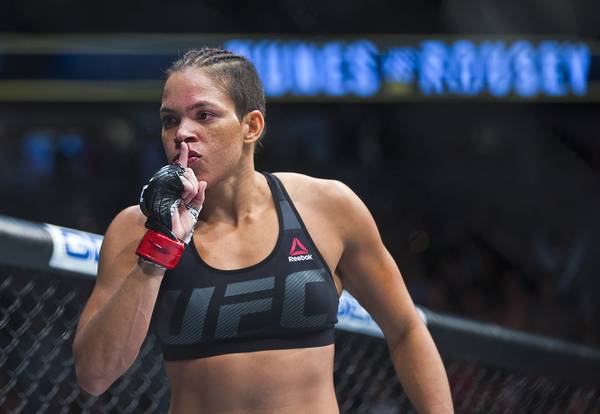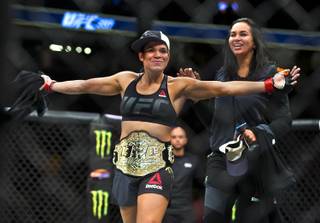Related Coverage
From the first punch Amanda Nunes threw, the sound in Ronda Rousey’s corner was panic.
The cries of desperation from Rousey’s head coach, Edmond Tarverdyan, cut through the clamor of a local record 18,533 fans Friday night at T-Mobile Arena as the UFC 207 main event began. He implored Rousey to do something, to do anything to defend herself.
“Head movement,” Tarverdyan screeched. “Hands up. Move, move, please!”
Rousey didn’t do any of it, resigning herself to a knockout loss 48 seconds into the women’s bantamweight championship bout. That’s at least partly because she was so conditioned to never have to do any of it.
Rousey reached such heights in the UFC, where an adoring sold-out arena of fans showed up despite her going into hiding for 13 months after suffering her first loss, because she was so far above her competition. She stopped her first 12 opponents in mixed martial arts virtually without suffering a scratch almost solely based on her Olympic-level athleticism and judo game.
In the early days of female MMA’s rise as a major sport, that dominance in one area was enough. It was enough that the UFC broke its long-held insistence that women would never fight in its octagon because of Rousey, and Rousey alone.
UFC President Dana White made it no secret, saying at the time of introducing female fights in early 2013 that the promotion could eventually build up a division that would produce viable challengers for Rousey.
In other words, opponents would catch up. What wasn’t in the plans was that they would not only catch up, but also sprint past and lap Rousey.
And in Amanda Nunes’ case, twirl the figurative baton on the way by as a taunt.
“That’s it for her,” Nunes said after the victory. “I know she’s going to retire. She can’t take it anymore. If she wants a rematch, I will do the same thing. She can’t take my punches.”
Nunes need not worry; there will be no talk of a rematch. This won’t be like when Rousey lost to Holly Holm via second-round knockout at UFC 193 last November.
That was easy to write off a one-time setback, the inevitable loss that every great in the history of MMA is forced to fight their way back from. But Rousey repeated her same mistakes against Nunes, only committing them more egregiously to confirm that the sport has moved beyond her.
When she tried to shield herself with family members as she rushed out the venue crying, there was no air of shock like there was in Melbourne, Australia after the Holm fight. There was only a feel of finality.
“She’s devastated,” White, who spent time with her backstage before she snuck away out of sight from any media, said on the Fox Sports 1 post-show. “She’s a competitor. She’s upset, but I think it’ll be better than the Holly Holm fight.”
Holm was the first sign of the changing landscape of women’s MMA. A championship-level boxer, she decided to start training in MMA more seriously right as Rousey was making it more valuable to do so.
She trained with one of the most decorated teams in the sport, led by coaches Greg Jackson and Mike Winkeljohn in her native Albuquerque, N.M., to supplement her expertise in one area with world-class direction in all the others. That’s something Rousey would never do.
She stayed with her original team and refused to consider looking elsewhere, even as her own mother pleaded for better coaching. In some ways, it was hard to blame her.
Rousey was so much better than everyone else for so long that changing anything may have felt unnecessary. But everyone around her was improving while she was stuck in the status quo.
Nunes was an unspectacular up-and-coming fighter with two losses when Rousey first beat Miesha Tate to win the Strikeforce women’s bantamweight championship and make women’s MMA a potentially lucrative career. Watching Rousey’s notoriety increase gave Nunes something to strive for.
She began thinking of Rousey obsessively, training her judo defense as much as her primary disciplines of Muay Thai and Brazilian jiu-jitsu. The initial thought might have been that it would take a generation to get to a new stage of evolution in women's MMA.
But less than four years after the UFC added it, there are now a whole host of fighters like Nunes who diversified their games and reached an elite level while eyeing Rousey.
“Now the division is getting interesting — new everything,” Nunes said. “Now everyone can stop talking about Ronda Rousey (and) Miesha because we have a lot of other talent in the division, and people can see that.”
The UFC helped put the target Rousey always welcomed on her back. The problem was it was supposed to be a moving target.
Rousey was supposed to progress at the same rate as those gunning for her. She never did, and there was nothing her team could do about it against Nunes.
She was too easy to hit.
Case Keefer can be reached at 702-948-2790 or [email protected]. Follow Case on Twitter at twitter.com/casekeefer.



Join the Discussion:
Check this out for a full explanation of our conversion to the LiveFyre commenting system and instructions on how to sign up for an account.
Full comments policy